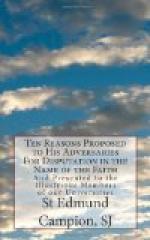it nothing better than a love-song about a mistress,
and an amorous conversation with Court flunkeys.
Whence drew he that intimation? From the Spirit.
In the Apocalypse of John, every jot and tittle of
which Jerane declares to bear some lofty and magnificent
meaning, Luther and Brent and Kemnitz, critics hard
to please, find something wanting, and are inclined
to throw over the whole book. Whom have they consulted?
The Spirit. Luther with preposterous heat pits
the Four Gospels one against another (Praef. in
Nov. Test.), and far prefers Paul’s
Epistles to the first three, while he declares the
Gospel of St. John above the rest to be beautiful,
true, and worthy of mention in the first place,—thereby
enrolling even the Apostles, so far as in him lay,
as having a hand in his quarrels. Who taught
him to do that? The Spirit. Nay this imp
of a friar has not hesitated in petulant style to
assail Luke’s Gospel because therein good and
virtuous works are frequently commended to us.
Whom did he consult? The Spirit. Theodore
Beza has dared to carp at, as a corruption and perversion
of the original, that mystical word from the twenty-second
chapter of Luke, this is the chalice, the new testament
in my blood, which (chalice) shall be shed
for you [Greek: potaerion ekchunomenon], because
this language admits of no explanation other than
that of the wine in the chalice being converted into
the true blood of Christ. Who pointed that out?
The Spirit. In short, in believing all things
every man in the faith of his own spirit, they horribly
belie and blaspheme the name of the Holy Ghost.
So acting, do they not give themselves away? are they
not easily refuted? In an assembly of learned
men, such as yours, Gentlemen of the University, are
they not caught and throttled without trouble?
Should I be afraid on behalf of the Catholic faith
to dispute with these men, who have handled with the
utmost ill faith not human but heavenly utterances?
I say nothing here of their perverse versions of Scripture,
though I could accuse them in this respect of intolerable
doings. I will not take the bread out of the mouth
of that great linguist, my fellow-Collegian, Gregory
Martin, who will do this work with more learning and
abundance of detail than I could; nor from others
whom I understand already to have that task in hand.
More wicked and more abominable is the crime that I
am now prosecuting, that there have been found upstart
Doctors who have made a drunken onslaught on the handwriting
that is of heaven; who have given judgment against
it as being in many places defiled, defective, false,
surreptitious; who have corrected some passages, tampered
with others; torn out others; who have converted every
bulwark wherewith it was guarded into Lutheran “spirits,”
what I may call phantom ramparts and parted walls.
All this they have done that they might not be utterly
dumbfounded by falling upon Scripture texts contrary
to their errors, texts which they would have found
it as hard to get over as to swallow hot ashes or
chew stones. This then has been my First Reason,
a strong and a just one. By revealing the shadowy
and broken powers of the adverse faction, it has certainly
given new courage to a Christian man, not unversed
in these studies, to fight for the Letters Patent
of the Eternal King against the remnant of a routed
foe.




